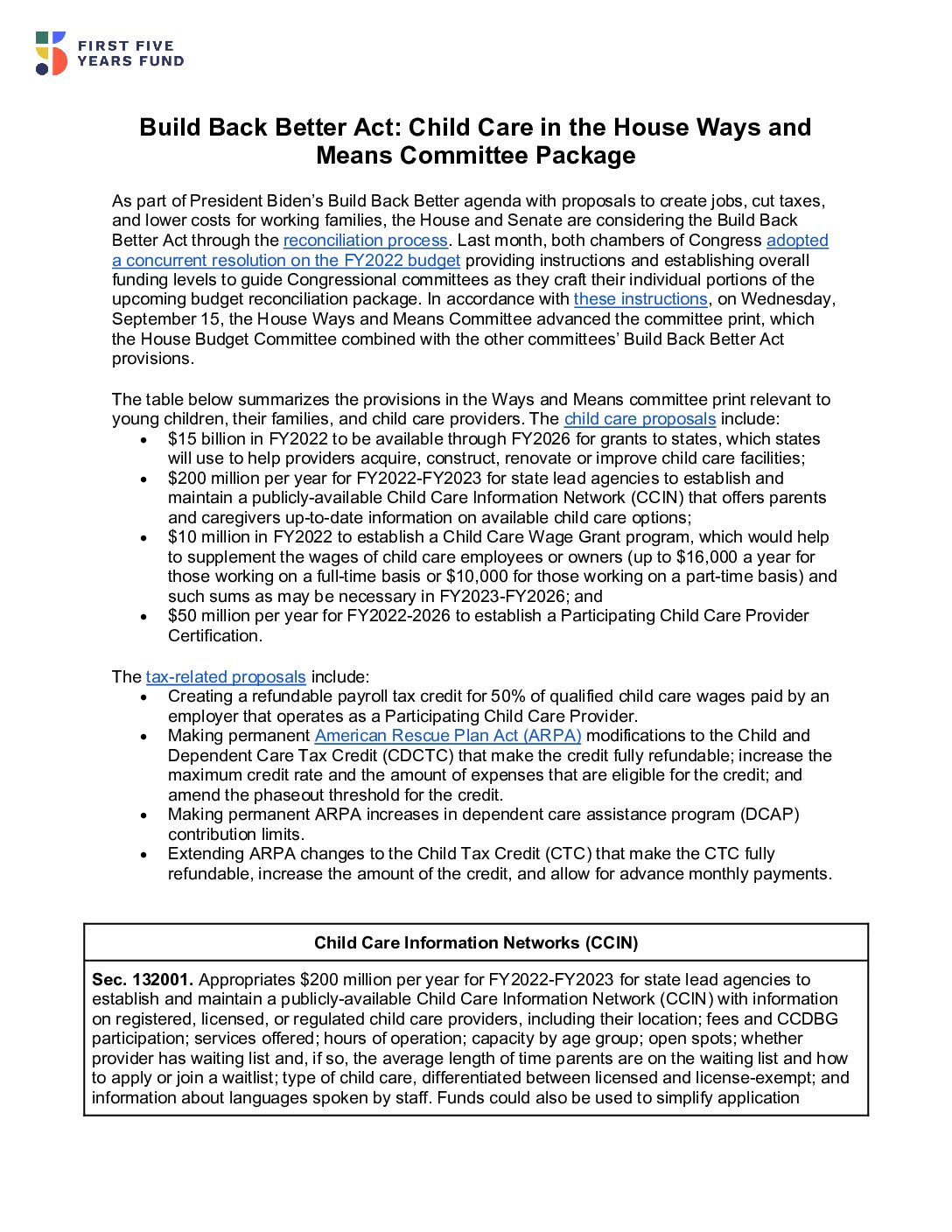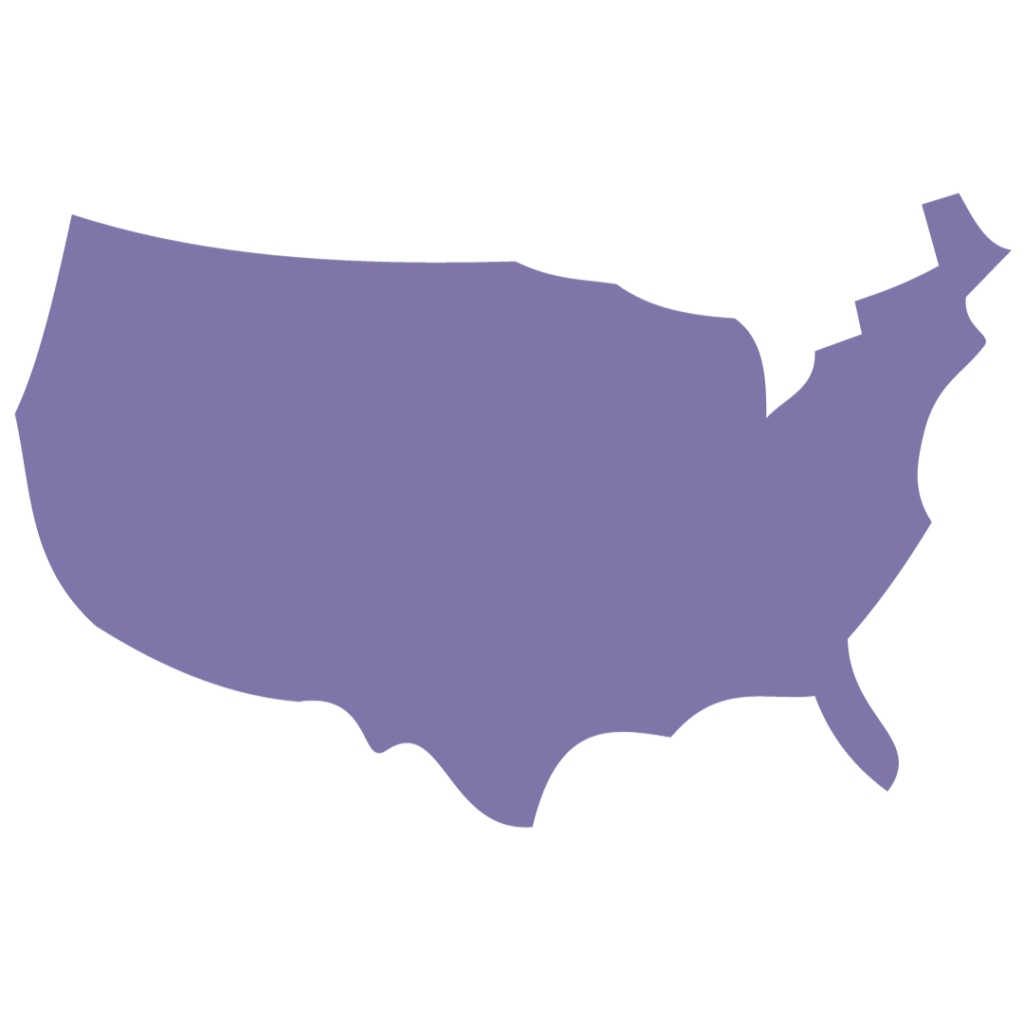Build Back Better Act: Child Care in the House Ways and Means Committee Package

As part of President Biden’s Build Back Better agenda with proposals to create jobs, cut taxes, and lower costs for working families, the House and Senate are considering the Build Back Better Act through the reconciliation process. Last month, both chambers of Congress adopted a concurrent resolution on the FY2022 budget providing instructions and establishing overall funding levels to guide Congressional committees as they craft their individual portions of the upcoming budget reconciliation package. In accordance with these instructions, on Wednesday, September 15, the House Ways and Means Committee advanced the committee print, which will now proceed to the House Budget Committee to be combined with other committees’ Build Back Better Act provisions.
The table below summarizes the provisions in the Ways and Means committee print relevant to young children, their families, and child care providers. The child care proposals include:
- $15 billion in FY2022 to be available through FY2026 for grants to states, which states will use to help providers acquire, construct, renovate or improve child care facilities;
- $200 million per year for FY2022-FY2023 for state lead agencies to establish and maintain a publicly-available Child Care Information Network (CCIN) that offers parents and caregivers up-to-date information on available child care options;
- $10 million in FY2022 to establish a Child Care Wage Grant program, which would help to supplement the wages of child care employees or owners (up to $16,000 a year for those working on a full-time basis or $10,000 for those working on a part-time basis) and such sums as may be necessary in FY2023-FY2026; and
- $50 million per year for FY2022-2026 to establish a Participating Child Care Provider Certification.
The tax-related proposals include:
- Creating a refundable payroll tax credit for 50% of qualified child care wages paid by an employer that operates as a Participating Child Care Provider.
- Making permanent American Rescue Plan Act (ARPA) modifications to the Child and Dependent Care Tax Credit (CDCTC) that make the credit fully refundable; increase the maximum credit rate and the amount of expenses that are eligible for the credit; and amend the phaseout threshold for the credit.
- Making permanent ARPA increases in dependent care assistance program (DCAP) contribution limits.
- Extending ARPA changes to the Child Tax Credit (CTC) that make the CTC fully refundable, increase the amount of the credit, and allow for advance monthly payments.
| Child Care Information Networks (CCIN) |
| Sec. 132001. Appropriates $200 million per year for FY2022-FY2023 for state lead agencies to establish and maintain a publicly-available Child Care Information Network (CCIN) with information on registered, licensed, or regulated child care providers, including their location; fees and CCDBG participation; services offered; hours of operation; capacity by age group; open spots; whether provider has waiting list and, if so, the average length of time parents are on the waiting list and how to apply or join a waitlist; type of child care, differentiated between licensed and license-exempt; and information about languages spoken by staff. Funds could also be used to simplify application processes. Appropriates $50 million per year in FY2022-FY2026 for HHS for administrative expenses. Sec. 132003. Appropriates $17.5 million per year for FY2022-FY2026 to provide technical assistance to lead agencies to support the State CCINs. This includes assistance to start new licensed child care businesses or reopening a closed child care facility in areas where there is a child care shortage or risk of a shortage; to state and local governments to incentivize public-private partnerships; and to support child care business technical assistance. Funds can also be used to provide technical assistance to States to increase child care availability and affordability. |
| Providers and Workforce |
| Sec. 132001 (sec. 418A(c)). Requires the Secretary to maintain current information on child care providers who are qualified to receive the HHS Participating Child Care Provider Certification for a calendar year (qualifications for the certification are outlined in the bill). Sec. 137301. Provides a refundable payroll tax credit for 50% of qualified child care wages paid by an employer that operates as a Participating Child Care Provider. “Qualified child care wages” are wages paid above the GS-3 step 1 rate for the applicable time period and locality, paid to employees other than highly-compensated employees (the threshold for which starts at $130,000 and is adjusted for cost of living). The maximum wages that can be taken into account is set at $2,500 per quarter per employee and will be adjusted for inflation after 2022. Health plan expenses allocable to qualified wages are included in wages. Gross income is increased by the amount of the credit. Sec. 132005. Through FY2022, would provide $10 million to establish a Child Care Wage Grant program to reimburse states for the costs of providing child care wage grants to qualified child care providers. (For FY2023-FY2026, the bill appropriates such sums as may be necessary for reimbursements for the grants.) Providers would use the funds to supplement the wages of child care employees or owners up to $16,000 per year for those working on a full-time basis or $10,000 for those working on a part-time basis. |
| Facilities |
| Sec. 132002. Provides $15 billion in FY2022 to be available through FY2026 for grants to states, which states will use to help providers acquire, construct, renovate or improve child care facilities. States must submit expenditure plans based on an analysis of a state’s need for child care infrastructure investments. Up to $2.25 billion can be awarded as grants of no more than $15 million to intermediary organizations with experience in child care facilities financing for the purpose of capacity building, providing technical assistance, and financial products to develop or finance child care facilities. |
| Expand Supply |
| Sec. 132004. Provides $200 million per year for FY2022-FY2026 for grants to the lead agencies of Indian tribes and tribal organizations to develop a CCIN, coordinate with HHS on the Participating Child Care Provider Certification, and conduct infrastructure projects to improve the safety of child care facilities. Of the funds appropriated, up to $1 million could be used to conduct consultations with Indian tribes and tribal organizations to determine how to better conduct consumer outreach and education and provide timely availability for child care slots; improve child care infrastructure; and inform best practices and guidelines for carrying out grant activities. |
| Tax |
| Sec. 137102-137103. Extends through 2022 the ARPA modifications to the Child Tax Credit (CTC) making the CTC fully refundable, increasing the amount of the credit to $3,000 for children ages 6-17 and to $3,600 for a child under age 6, and reducing the additional $1,000/$1,600 per child by $50 for every $1,000 a taxpayer’s modified AGI exceeds $75,000 ($150,000 for joint returns and $112,500 for head of household). The credit plateaus at $2,000 and then phases out at the present levels in effect through 2025. Also indexes the amounts for inflation and directs the Secretary of the Treasury to continue providing the CTC through advance monthly payments and to maintain an online portal to allow taxpayers to opt-out of receiving advance payments and update information to determine taxpayers’ maximum eligible credit. Extends through 2025 a $500 nonrefundable tax credit for dependents other than child dependents and indexes the value of this credit for inflation. Sec. 137201. Makes permanent American Rescue Plan Act (ARPA) modifications to the Child and Dependent Care Tax Credit (CDCTC) and indexes for inflation both the maximum credit amount and the phaseout threshold. For tax year 2021, the ARPA amended the CDCTC to make the credit fully refundable; increase the maximum credit rate to 50%; increase the amount of expenses that are eligible for the credit to $8,000 for 1 qualifying individual and $16,000 for 2 or more qualifying individuals (such that the maximum credits are $4,000 and $8,000); increase the phaseout threshold from $15,000 to $125,000; and add a phaseout (0-20%) for those with AGI above $400,000, such that taxpayers with income in excess of $500,000 are not eligible for the credit. Sec. 137202. Makes permanent the ARPA increase in dependent care assistance program contribution limits (from $5,000 to 10,500 or from $2,500 to $5,250 in the case of a separate return by a married individual) and indexes the amounts for inflation. Sec. 137401. Makes permanent the ARPA eligibility expansion of the Earned Income Tax Credit (EITC) for taxpayers with no qualifying children and the ARPA provision allowing taxpayers to use prior-year earned income to compute the EITC. For tax year 2021, the ARPA amended the childless EITC to reduce the minimum age from 25 to 19 (except for certain full-time students); eliminate the upper age limit; increase the credit percentage and phaseout percentage to 15.3%; increase the income at which the maximum credit amount is reached to $9,820; and increase the income at which phaseout begins to $11,610 for unmarried filers ($17,550 if married). Under these parameters, the maximum credit amount nearly triples to $1,502. Amounts will be indexed for inflation. |
Subscribe to FFYF First Look
Every morning, FFYF reports on the latest child care & early learning news from across the country. Subscribe and take 5 minutes to know what's happening in early childhood education.




